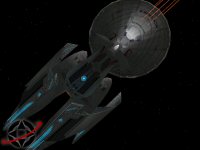Ship name: USS Katana
Registry number: NX-4502
Ship class: Yamoto
Captain: Atcab Sethur
Crew: 220
Contruction: Utopia Planetia, Mars Orbit, Sol System
Tour Of Duty
Launched: 5642.1
Shake down cruise: 5651.4
Engaged Klingon faction at Endora Core: 5722.9
Destroyed at Endora Core: 5723.0
Current Status
The USS Katana was destroyed at the battle of Endora Core.
Major Engagements
Fought two heavy Klingon cruisers at Endora Core system. Destroyed one and crippled other. The Katana was nearly crippled, the warp drive was a write off. Fearing Klingon reinforcements might capture the ship, the crew abandoned ship. With the warp core offline and lacking a secondary self-destruct system, the captain set a course for Endora Core III, then took the last remaining shuttle and escaped. The Katana broke up and disitegrated in the atmosphere of the gas giant Endora Core III.
Specification
Unique Hull Design
The Kanata incorporates one primary hull saucer section plus two secondary hulls, each with its own deflector array. There are four warp necelles and two shuttle bays at the rear of each secondary hull. At the time she was built, the Katana was one of the largest ships in the fleet and certainly a ship with the longest bow to stern length.
Weapons
- Phasers (6)
- Photon Torpedos (4)
- Assault Phasers (2)
- Reinforced Shields
Assault Phasers
The Yamato class warship features two forward assault phasers. These massively powerful weapons can cut straight through hulls or reduce shield arrays to tatters.
Assault phasers require a tremendous amount of power to fire. Unlike traditional phasers, their power diminishes with range, so a close range shot will do severe damage, but a long range one will only glance the shields. The assault phasers also have a targetting error due to the severe kinetic shock the weapon creates when fired.
The firing also has a noticable chance of back-fire. In that event, the super-charged plasma must be discharged. The only system capable of handling the temperatures involved is the impulse manifolds. Unfortunately this results in an impulse stall - speed drops and the nose pitches uncontrollably. This requires a complete engine restart and the weapon also needs to be re-initialised. In battle this can be disastrous. If this were not bad enough, the weapon can damage itself, requiring a drydock repair, and in extreme circumstances, can damage the forward phaser array.
